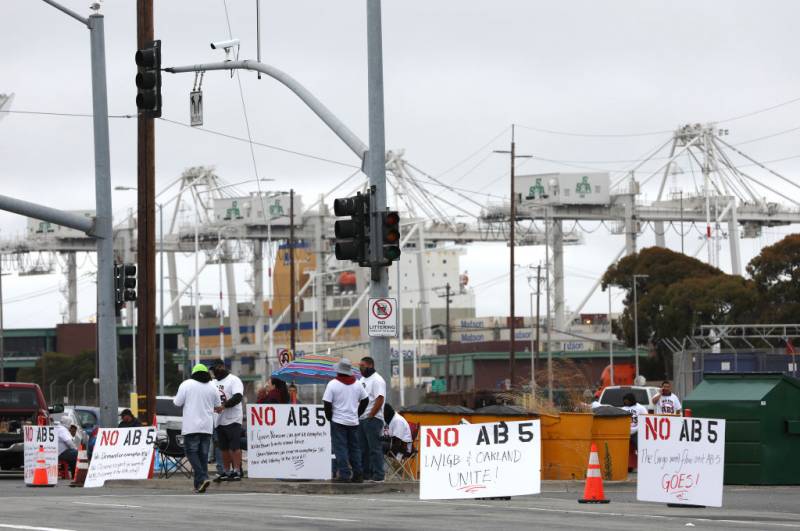Update 4:30 p.m. Monday
Marine terminals were open and again operating normally at the Port of Oakland following a five-day long near-total shutdown by truckers, port officials said Monday.
"The Port of Oakland has resumed full operations" on Saturday, said port executive director Danny Wan. "We appreciate the independent truck drivers' use of the designated Free Speech Zones and we thank local law enforcement for their continued assistance."
Oakland police and other law enforcement agencies are working to keep traffic at the port moving, officials said.
Port spokesman Robert Bernardo said it will still likely take weeks to alleviate the backlog of goods at the port, resulting in further delays of product shipments.
Last updated, 4:30 p.m. Friday
Cargo operations at the Port of Oakland remained largely stalled on Friday, as a convoy of truckers continued to block access to the facility for the fifth straight day to protest California's gig-worker law.
The demonstrations that began Monday involve hundreds of independent big-rig truckers who have prevented the movement of cargo in and out of the port's terminals, in a bid to remain classified as independent contractors – rather than employees. Truckers held similar protests last week at the ports of Los Angeles and Long Beach.
"I think it's very clear that there is so much uncertainty about how these independent drivers, these entrepreneurs, are going to be able to stay in business," said Matt Schrap, CEO of the Harbor Trucking Association. The organization represents truckers servicing West Coast ports.
The blockade, which couldn't come at a worse time for the port, is further exacerbating longstanding global supply-chain issues spurred by the pandemic that have led to months of epic cargo ship traffic jams, with mountains of goods stockpiled on docks.
In an open letter sent on Thursday evening, Danny Wan, executive director of the port, said he had met with protest organizers, and emphasized that he understood their frustrations, offering to support them in any negotiations with state. But he implored them to allow operations at the port to resume, warning of the collateral damage further disruptions would inflict.
Wan said the port had set aside "free speech zones" for truckers to protest without disrupting the flow of commerce, and warned that any demonstrators whose trucks continued to obstruct terminal entrances or exits could be cited and face additional penalties.
Port officials and organizers planned to meet again on Friday afternoon.
